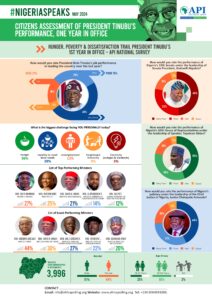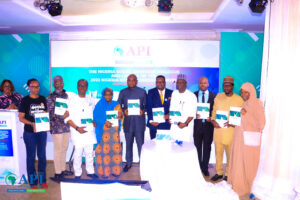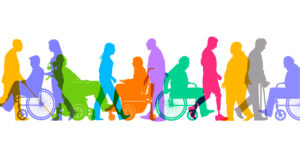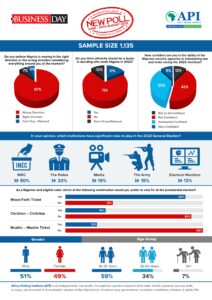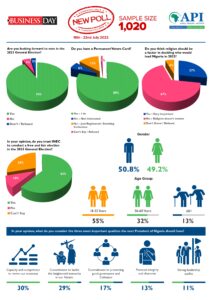8 IN 10 NIGERIANS WOULD NOT SUPPORT A SECOND LOCKDOWN
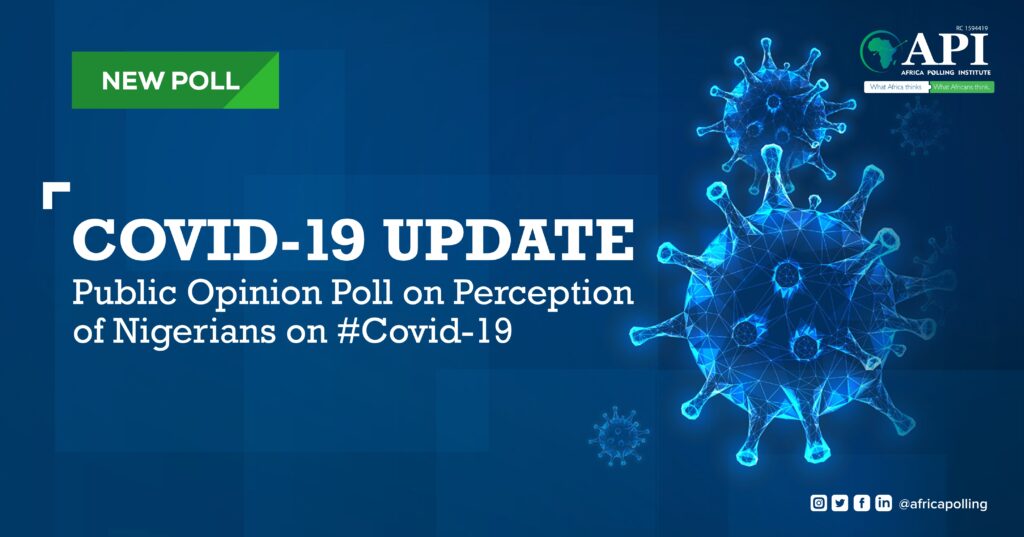
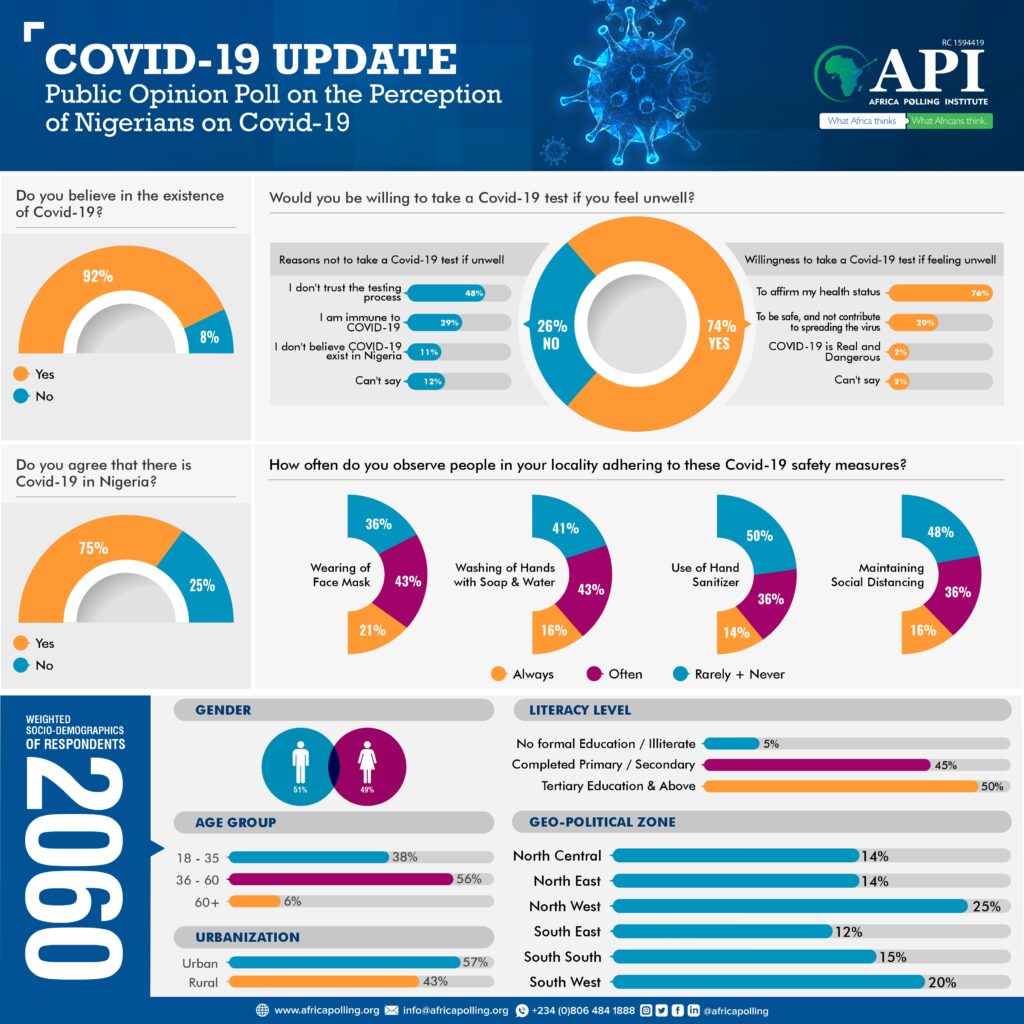
Abuja, Nigeria, November 12, 2020 – Africa Polling Institute (API), an Abuja-based opinion research think-tank, has released a new public opinion poll reflecting an update on the Coronavirus Disease
(Covid-19). Findings from the new poll has shown that while majority of Nigerians (92%) believe in the existence of Covid-19, and 75% believe in its existence in Nigeria, only 60% said they will be willing to take a Covid-19 vaccine if made available. Further findings revealed that 84% of Nigerians are not in support of a second total lockdown in view of the first which was characterized by movement restrictions, social distancing, military-styled curfew with a non-comprehensive distribution of drugs, foods, agricultural, sanitary and sundry palliative materials. The poll also indicates an increasing awareness about the virus with 74% opining that they are willing to undertake a Covid-19 test if they feel unwell and have symptoms similar to those of virus. The poll was conducted to investigate the perception and opinions of Nigerians about the most recent realities and responses of both citizens and the authorities to the novel Covid-19 pandemic. This poll forms a significant part of API’s efforts at fostering citizens’ engagement and contributing meaningfully by providing credible data on burning issues, considering the pertinent issues associated with the management of the Covid-19 pandemic in Nigeria. The Covid-19 pandemic which has almost put a standstill on most activities of the world, has led to the enforcements of lockdown restrictions; limiting some levels of national and international movements and driving key social interaction policies, some of which restrict certain degrees of relationship with its attendant consequences.
The nationwide poll was conducted in the first week of November, between the 2nd and 6th November 2020 via telephone interviews, and using a Stratified Random Sampling technique. A total of 2060 completed interviews were captured in the poll out of 6510 calls made representing a response rate of approximately 32%. The sample comprised of 51% Male and 49% Female respondents whose age ranged from 18 years and above. The interviews were conducted in five major Nigerian languages: English, Pidgin, Hausa, Igbo and Yoruba; and geographic quotas were assigned to ensure the selection of a nationally representative sample, which proportionately covered all senatorial districts and states, including the FCT.
Key Findings from the Poll
Beyond demographic information and introductory variables, the new Poll asked respondents ten (10) key questions ranging from whether or not they believe in the existence of Covid-19; awareness of the existence of Covid-19 in Nigeria, perceptions about responses of NCDC/PTF to management of the virus, opinions on a possible 2nd lockdown order, suggestions on the reception and willingness to take Covid-19 vaccines if and when available amongst others. The findings from the poll are briefly highlighted below:
Believe in the Existence of Covid-19 Globally and in Nigeria
The poll sought to ascertain the proportion of respondents who believe in the existence of the novel Coronavirus disease globally. The results clearly showed that a significant number of Nigerians sampled (92%) believe in the existence of the Covid-19. On the other hand, only 8% of respondents believe in the non-existence of the novel Coronavirus disease. When disaggregated across key demographics, there are clear disparities in response patterns, indicating diverse perceptions about the believe in the existence of the Covid-19 pandemic. For instance, the data shows that while 21% of respondents from the South-East do not believe in the existence of the virus, only a marginal 2% from the North-West had similar response. The demography also indicates that irrespective of literacy levels, there is remarkable believe by most Nigerians in the existence of Coronavirus as there were no noteworthy differences in responses amongst Nigerians across educational levels. Almost in like manners, while 75% of Nigerians agree that the virus not only exist but has a presence in Nigeria, 25% reasoned otherwise and were vehement about the non-existence of the virus in Nigeria.

Willingness to Take the Covid-19 Test when Unwell and Trust in the Information Provided by NCDC
The poll also sought to elicit Citizens’ perception on their disposition to taking a Covid-19 test when they feel unwell. An overwhelming 74% of Nigerians submitted that they are willing to take a Covid-19 test when they feel unwell as against 26% who opined otherwise. While 76% of the respondents also indicate that the probable reason that can prompt them undertaking a Covid-19 test is to affirm their health status, 48% (of those who said they will not take a Covid-19) submitted that they do not trust the testing process and will not take any when they feel unwell. Further disaggregation of the data showed that respondents who are resident in urban areas (78%) are more willing and likely to take a Covid-19 test if they feel unwell as against 71% who are resident in the rural areas. The optimism shed in the willingness to take a Covid-19 test seemingly appears to be a tacit approval of the activities of the Nigeria Centre for Disease Control (NCDC) as 73% of Nigerians sampled say they have significant trust in the information provided by the Centre some of which include the expert guide and daily updates often made available on their website and in close collaboration with the Presidential Taskforce on Covid-19.
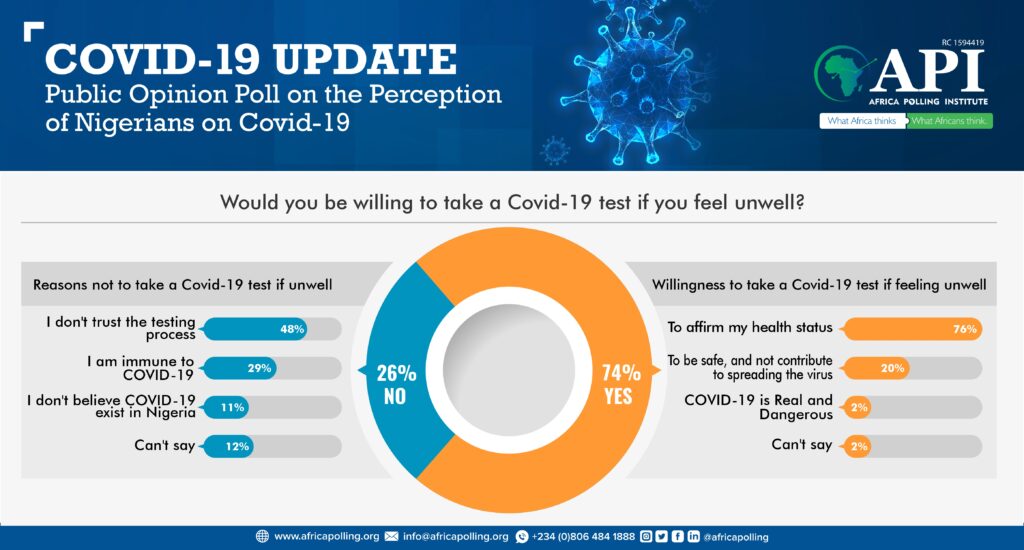

Adherence to Safety Measures against Covid-19
Concerns about adherence to safety measures against the prevalence of Coronavirus were raised in the poll. Accordingly, 21% submitted that they believe that they and the people in their locality fully adhere to the prescribed safety measures put in place by government agencies (NCDC and PTF / State Taskforces on Covid-19), on the other hand, opinions of respondents (55%) show that they and people in their locality adhere partially to the safety measures against the disease and observed that people in their locality adhere partially to safety measures. This is against 20% who disagreed on the note that the people in their locality have moved on and 4% who maintained that they have no idea about the question.
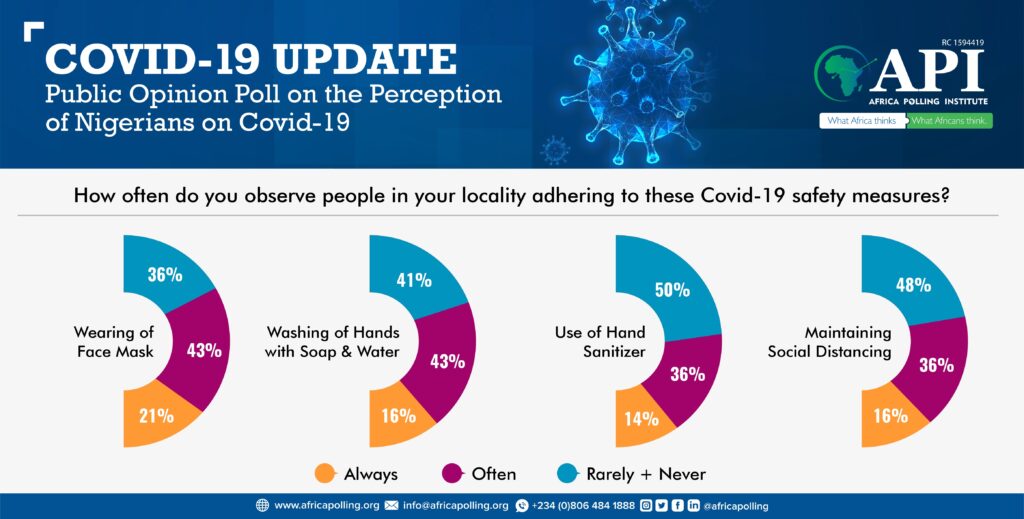
Readiness to Take COVID Vaccine if Made Available Versus Justifications for Take
There were disparities in the opinions of respondents as regards their readiness to take Covid-19 vaccines if made available. 60% of Nigerians sampled affirmed that they are willing to take a Covid-19 vaccine when available while 25% said they are not willing to and 15% neither agreed nor disagreed as they claimed that they do not know if they are ready to do so. Interestingly, more Nigerians from the rural areas (65%) suggested that they are willing to take the vaccine as against 55% domiciling in urban areas. Again, 51% of those sampled submitted that they are willing to take vaccine against Covid-19 because it will improve their immune system and thus form resistance against the virus while 41% of those who are not willing to take the vaccine said they will not do so because they do not believe in the existence of the virus in Nigeria. Another 25% of this group suggested that they are worried about the side effects of the vaccine while 16% averred that they are not at the risk of contracting the Covid-19.

Support for a Second Lockdown Given the Experience of the First
Respondents were probed to ascertain their opinion about a probable second nationwide lockdown given the yet increasing tide in cases of Coronavirus globally and amongst Nigerians who as a result of the relaxed lockdown restrictions have continued all forms of social interactions and mobility which were hitherto halted. In response to this, an overwhelming 84% said they are not in support of a second lockdown even though foremost Western European Countries like United Kingdom and France have declared a second partial lockdown intended towards curtailing the second wave of the dreaded virus. 16% of those sampled however affirmed that they are in support of another lockdown. Remarkably, there were more responses from the North-Eastern Nigeria (32%) affirming their support for a second lockdown as against a marginal 5% response from the South-East who supported a possible second lockdown. This increase in response rate supporting a second lockdown in the North-East is expectedly associated with the renewed violent attacks by the Boko Haram in the region, indicating their approval for the lockdown which will afford them the opportunity of staying indoors and by extension limiting the volatilities ensuing from suicide bombings, sporadic shootings and kidnappings been perpetrated by the insurgent group.

Recommendations
Arising from the above findings, this opinion poll has demonstrated API’s effort at producing and disseminating credible Africa-led and Africa-owned public opinion polls geared towards supporting better public policy, practice and advocacy. In line with this goal, and in consonance with the findings of the new poll therefore, the following recommendations are succinctly advised:
I. The poll clearly highlighted the widespread awareness of the existence of Covid-19 amongst Nigerians, as posited by 92% of respondents; nonetheless, there remains a crucial need for government sustain efforts educating and enlightening the populace, especially via a collaborative synergy amongst grassroot platforms, the Presidential Task Force on Covid-19 (and similar instruments across the States), the National Orientation Agency (NOA). A telecommunication mobile device software can be launched and deployed in transmitting information on health restrictions, financial, food and drug palliatives amongst citizens. This will help foster robust understanding in further implementing the Covid-19 restrictions amongst both urban and rural communities. Leaders of Market Associations, People Living with Disabilities (PLWDs), Community and Faith-Based groups must as a matter of urgency be mainstreamed into this plan so as to shrink the gap in information on Nigeria Covid-19 response.
ii. The poll indicates that in some quarters, the citizenry obviously became averse to the efforts of key stakeholders charged with enforcing compliance to certain health and social restrictions as 55% of those sampled submitted that people in their locality only adhered “partially” to safety measures associated with the pandemic. Full compliance can however be actualized if there is persistent dissemination of information on the dangers of non-conformity to the prescribed safety restrictions. The National Broadcasting Corporation (NBC) can engage with frontline print and electronic media houses to ensure relentless awareness campaigns denoting the imperative for adherence to safety measures. Additionally, public and private offices that do not enforce and provide handwashing and sanitizing tools for use by the public should be clamped down and duly sanctioned.
iii. The realities of the Covid-19 pandemic indicate an urgent imperative for the centralization and reform of the Nigerian small-scale economic sector. The justification for an ICT-based production and distribution of goods and services came to a standstill during the lockdown. Government should also diversify the response mechanisms it has employed overtime so as to consolidate on the successes it has achieved so far. The economy can be made freer with more supervision rather than blunt closure of certain production means under the guise of lockdown.
Conclusion
The eruption of Covid-19 pandemic apparently portends great danger for the globe as a whole. The negative consequence it has had on the socioeconomic livelihood in Nigeria is even more worrisome. While the reality of the disease seemingly appears inescapable, Government’s response to ameliorate the varying impacts of Covid-19 pandemic and the accompanying first lockdown has had grievous effects on the poor. This, the poll has shown, is a trickle-down effect of an already existing defective economy.
The aforementioned conclusion stems from the centrality of the informal sector generally and its role in providing the structural base of the Nigeria’s economy. Hence, poor Nigerians who are particularly caught up in this trap have been plagued with heightened poverty, hunger, domestic violence and emotional trauma, a result of which has made them submit that they are not ready to undergo a second lockdown. Therefore, if favourable and positive nods are given to the above recommendations, efficient control and response of government will help stem the tides in the cases of the virus.
Dr. Bell Ihua
Executive Director
Africa Polling Institute (API)
